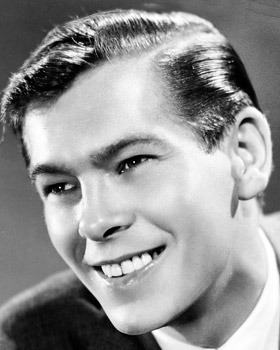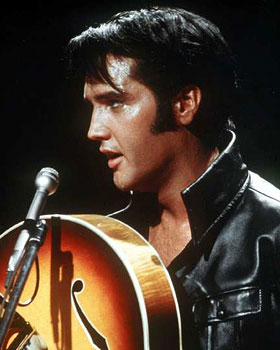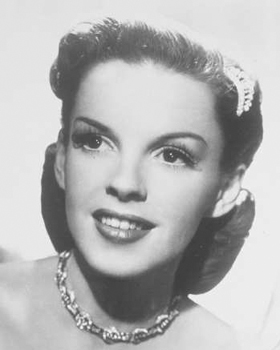Johnnie Ray
Johnnie Ray was a balladeer of tears who brought an emotional intensity to music that was singular to his era.
Always noted for his stormy style, Ray would jump about as he sang, bend his knees and cup his hand to his left ear. He often contorted his babyish face into a painful expression, tugged at his hair and cried.
Predictably, his first hit in 1950 was called "Cry." The other side of that record was "The Little White Cloud That Cried." They quickly became the No. 1 and No. 2 songs in the country, turning an awkward, shy boy into a national figure.
Music critics have said the intensity of his early vocals helped open the door for Elvis Presley and other white rock artists.
Born John Alvin Ray in Dallas, Ore. in 1924, Ray was the son of a man who played fiddle at square dances and a woman proficient on the piano. He became a self-taught pianist who sang at church and at school.
He came to Hollywood in 1949 to act in films but found only odd jobs as a bartender and piano player in clubs. He went to New York and then to Detroit, where he found work at the Flame Showbar. A local disc jockey persuaded a Columbia Records representative to give him a chance and the result was "Whiskey and Gin" and "Tell the Lady I Said Goodbye" for Okeh Records, a Columbia subsidiary. He was the only white artist on Okeh Records' black R&B roster.
"Whiskey Gin" and "Tell the Lady I Said Goodbye" became popular in the Midwest, but it wasn't until Ray returned to New York to record "Cry" and "Little White Cloud" that he became fully established. He followed those hits with "Please Mr. Sun" and "Brokenhearted," arranged by Mitch Miller. All four became million-sellers.
In 1952 he opened at the Copacabana in New York and the standing-room-only crowds (and press agents) began to call him "The Prince of Wails," "The Nabob of Sob" and "The Atomic Ray," among other sobriquets.
He became the first performer to earn $25,000 a week in Las Vegas and on March 23, 1953, made the first of nine appearances at the London Palladium.
The following year he came back to Hollywood to make the film debut he had sought earlier.
But records were his forte and he returned to the studio. In the next five years he made hits of "Just Walking in the Rain," "Walking My Baby Back Home," "Yes Tonight, Josephine," "Hernando's Hideaway," "Such a Night," "Somebody Stole My Gal" and more.
"Cry," his original hit, had sold 25 million copies total at the time of his death in 1990.
He married once, in 1952, to Marilyn Morrison, daughter of Mocambo nightclub owner Charlie Morrison, but they divorced.
His personal life was sometimes as pained as his music. He developed a drinking problem, he told The Times in 1976, but indicated he had conquered it.
Ray credited his success with "showing people the emotion they're afraid to show" and also said he had grown more appreciative of his career over the years.
He died of liver failure in 1990.
Related stars
|
|




One thought about Johnnie Ray
Share a thought about Johnnie Ray